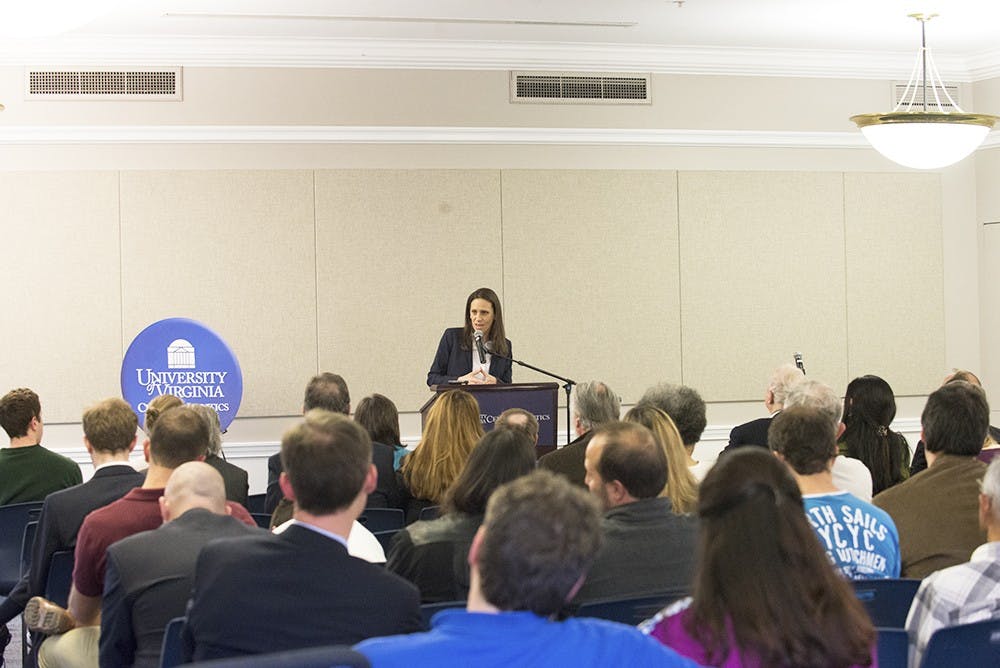The University Center for Politics hosted Ambassador of the Argentine Republic Cecilia Nahón Monday along with the Latin American Studies Program and as part of the Center’s Global Perspectives on Democracy Program’s Ambassador Series. Nahón spoke on sovereign debt restructuring and the systematic implications of the ongoing Argentine litigation case.
Nahón explained how the issue was significant on a global level, as the Argentine case could be setting a standard on how countries handle debt restructuring.
“The Argentine litigation case has been a game changer in the way of how countries deal with their debt at the global level,” Nahón said. “There’s a lot of change going on as it is an open-ended story and there are new issues and new developments as we speak. It is important to understand what it’s really about [and] what’s at stake.”
With public debt as a percentage of GDP at 166 percent, and $100 billion owed in government bonds, Argentina defaulted on its debt in 2001 — one of the biggest debt defaults in history. Under a new administration, the government restructured 93 percent of its debt by allowing investors to exchange the defaulted bonds for new and discounted ones.
A small hedge fund, NML Capital — constitutes the remaining 7 percent of unstructured debt. The group refused the proposals offered by Argentina, instead taking the country to court in New York, requiring full repayment on the bonds.
Nahón contextualized the dire economic and political situation the country experienced during the early 2000s, saying the crisis had affected all aspects of life.
“Argentina, at that point, not only defaulted on its debt but also defaulted on its people,” Nahón said.
In 2012, the federal appeals court in New York City ruled against Argentina, saying it had violated the pari passu clause as it had failed to treat bondholders equally. Argentina claimed the ruling grants privileged conditions to holdout creditors and that the country now cannot pay creditors who have accepted the exchange offer unless the holdout creditors are paid in full.
During her talk, Nahón made clear to the audience Argentina’s position in the months going forward, as they prepare to fight the court’s ruling.
“All we [are] asking is for the litigators to be reasonable,” Nahón said. “They just want to force us, to extort us to accept these terms and if Argentina accepted these proposals, we would be facing around $20 billion of claims, which is impossible for Argentina to pay.”
Nahón emphasized the ruling’s infringement on the country’s sovereignty, as well as noting the consequences of the of the 2012 court decision.
“[The] ruling that has been questioned by the whole world, it has gone against market interpretations, it goes against the interests of New York,” Nahón said. “It goes against the issue of sovereignty around the world.”
For Argentina, paying the bonds back in full would run the risk of creating an unsustainable amount of debt and could corner the country into another default. Nahón said the country has made significant progress in social inclusion and development, and the new ruling could hinder further development.
“We have expanded and strengthened the rights of our population in all aspects [especially] human rights in a very, very ample and ambitious way,” Nahón said. “We have devoted an important amount of our resources to benefit the most vulnerable people in our country. And all of this has been possible because debt has been sustainable.”
Emily Soule, a second-year College student who attended the event and has experience working with Argentinians, said the Argentine case poses complex questions on sovereignty and debt restructuring.
“It was interesting to see the Ambassador speak because I’ve seen the impact the economic crisis in Argentina [has] on their work when they come to the US,” Soule said. “It’s an interesting topic for the US when you consider how much debt we keep accruing to China.”
Daman Irby, the director of Global Initiatives at the Center of Politics, said the Ambassador Series is meant to engage the University community with events happening around the world.
“We look at different countries, sometimes whats going on in the news,” Irby said. “We try to provide diverse countries, and Argentina right now has a lot happening.”
University Professor and Director of the Center of Politics, Larry Sabato, noted the intimate relationship the University has cultivated with not only South America but particularly Argentina, as the University works with the U.S. Department of State to host students and educators from South America as part of the Department’s Youth Ambassador Program.
Nahón echoed these sentiments of global outreach engagement, advising students to “look out to the world.”
“You better understand the country you’re in to put that into perspective into issues that are global,” Nahón said. “Learn from the South — there’s a lot of things you can learn about issues such as inclusion, growth, democracy and bring those perspectives back to the US and think in a progressive way.”







